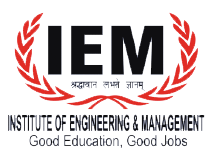
| Metric No. | 2.3. Teaching- Learning Process | ||||||||
2.3.1. QlM | Student-centric methods such as experiential learning, participative learning and problem-solving methodologies are used for enhancing learning experiences: Student-centric teaching methods involve active participation and engagement in the learning process. Experiential learning, participative learning, and problem-solving methodologies are instrumental in enhancing educational experiences. Experiential & Participative Learning: Experiential learning encourages students to learn through direct, hands-on experiences. It enriches their knowledge, communication, and teamwork skills. ● Visits to different industries (VECC, NTH, ERTL etc.) are arranged to minimize the gap between academia and industry. ● Students are encouraged to take up industry-related projects as their final year project assigned from 2nd year under the mentorship of the faculties and external members from industries. ● In regular intervals near about 40 model exhibitions and competitions, different techno-management fests (INNOVACION, SYTRON, SRIJAN, SMART Makers’ Fair, etc.) are organized to inculcate the culture of experiential and participative learning.
Problem solving methodologies: This method empowers students to share their perspectives, collaborate, and learn from their peers. ● To enhance practical problem-solving ability, special classes are present in daily routine, like Skill Development for Professional (SDP), Essential Studies for Professional (ESP), General Studies, GATE classes, competitive coding etc. ● Numerous coding competitions, olympiads, and hackathons are organized by each department to promote coding and problem solving culture. Link for Experiential learning & Participative learning: ● Number of courses that include experiential learning through project work / field work / internship during the year: Click here ● Link of Details of Workshop /Seminar/Industrial Visits (1st July, 2022 to 30th June, 2023): Click here Link of the MOU with different organization (Industry, Universities, research institute, students chapters): Click here ● Student participating in various model making competition : Click here ● Details of Skill Development for Professionals (SDP), Essential Studies for Professional (ESP), General studies for competitive exams: Click here | ||||||||
2.3.2. QlM | Teachers use ICT-enabled tools including online resources for effective teaching and learning: The institute uses Information and Communication Technology (ICT) in education to support, enhance, and optimize the delivery of education. Following ITC tools are used- 1. Internet (3.4 GBPS) 2. Classrooms: 84 ICT enabled classrooms. 3. LCD Projectors: 158 4. Computer Systems: 2426 5. Seminar 6. Printers: More than 115 available across all campuses. 7. Facilitiesfor conducting online classes are present through Zoom, Google Meet, Go to Webinar, Microsoft Team, Google Classroom. 8. Facilities for conducting virtual/physical labs using different software like LTSpice, Vesta, Logisim, Weka, R, Anaconda, Matlab etc are available. 9. Smart Board: 2 Smart boards are installed. 10. TV: Total 24 are installed at all prominent places across all the campuses. 11. Digital Library resources are also available. Details given below: · Journal: SAGE Publication & Serial publication · E journals: IEEE Digital Library (ASPP)-197, Delnet (online), J Gate- 29,306, Web of Science, EBSCO (Business Source Elite)-1064, Springer-222, Scopus, Proquest, NDL. · Library Software: LSEase, KOHA 12. IEM Learning (video lectures prepared by IEM faculties), LinkedIn, NPTEL, Coursera, SAP, Udemy, Edx . 13. Faculties evaluate student preparedness through online quiz via IEMCRP. 14. Microphone: 196 and sound system:130.
Links for the relevant documents: Click Here Computer Bills: Click here Computer Accessories Bills: Click here Internet bills: Click here IEM-Learning Links: Click here Digital Libary: Click here NPTEL: Link of the MOU with different organization (Eduskill, EDX etc.): Click here
| ||||||||
2.3.3. QnM
| Ratio of students to mentor for academic and other related issues: 2.3.3.1. Number of mentors: 349 (Faculty) Number of mentors: 80 (Alumni+Industry) Number of students: 5515
Mentor(Faculty) : Mentee 349:5515=1:15.8 Tri-Mentoring (Faculty+Alumni+Industry):
Mentor : Mentee [(Faculty+Alumni+Industry): Students] 431:5515=1:12 Link of relevant documents: Link for year-wise number of students enrolled: Click here Faculty List 2023: Click here Names of members for Tri mentoring: Click here Notice for mentor Link for sample mentee database: Click here | ||||||||
2.3.4 QlM | Preparation and adherence to Academic Calendar and Teaching Plans by the institution: The institution places paramount importance on meticulous preparation and strict adherence to the academic calendar and teaching plans. This commitment ensures a well-structured and organized learning environment for students, fostering a sense of discipline and consistency in educational pursuits. Preparation begins with the careful development of a comprehensive academic calendar, meticulously outlining key milestones, examination periods, and other essential events. The process of designing the academic calendar is initiated with a preliminary meeting of all HODs with the Director of the Institute, Controller of Examination (COE) and Dean Academics. This calendar serves as a roadmap for the entire academic year, providing students, faculty, and stakeholders with a clear overview of the educational journey ahead.
Simultaneously, the institution’s teaching plans are thoughtfully crafted to align with curriculum objectives and educational standards. Faculty members collaborate to design engaging and effective lesson plans to cater to various learning styles. This approach not only enhances the overall quality of education but also facilitates a dynamic and stimulating classroom experience for students. By upholding a commitment to the academic calendar and teaching plans, the institution cultivates an environment of accountability, reliability, and excellence in education, preparing students for success in their academic pursuits and beyond.
Relevant link:
Academic Calendar of July 2022 to December 2022: Click here
Academic Calendar of January 2023 to June 2023 : Click here
|